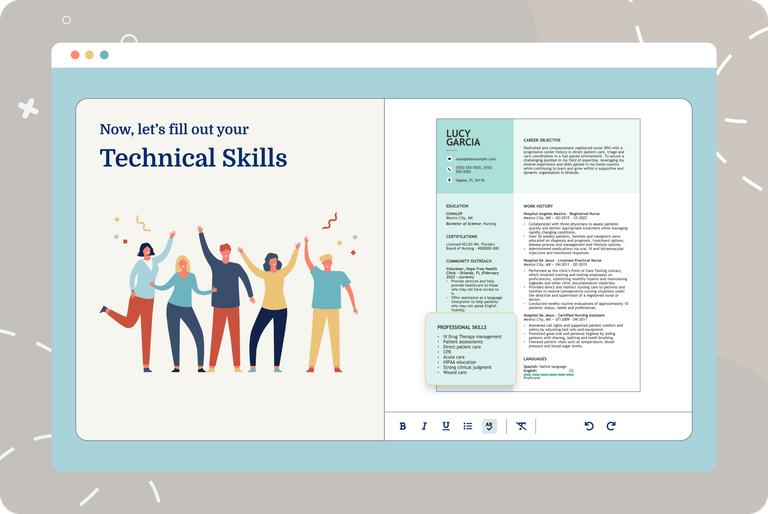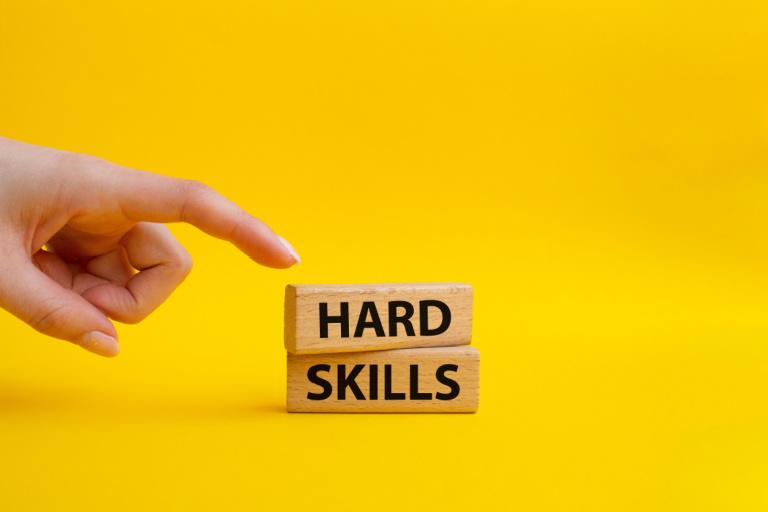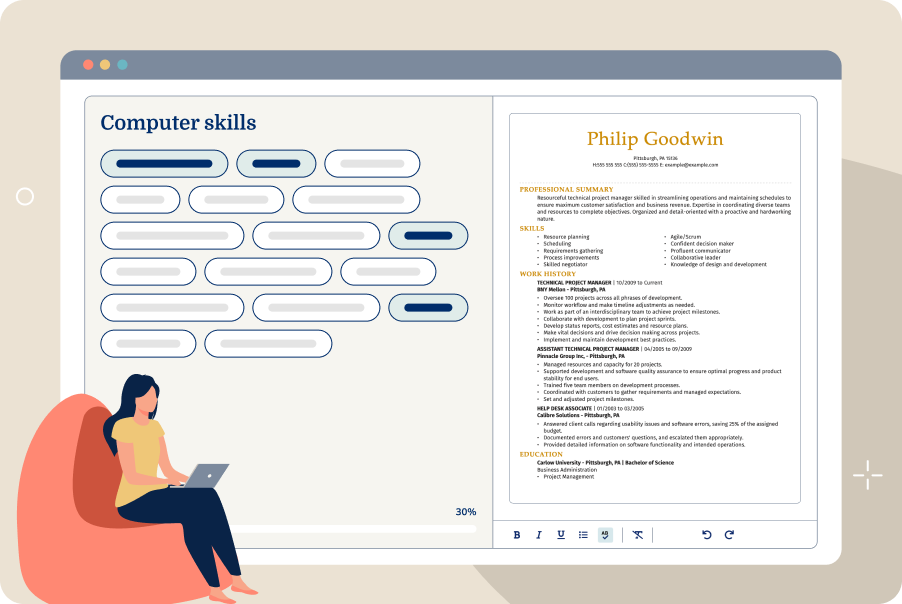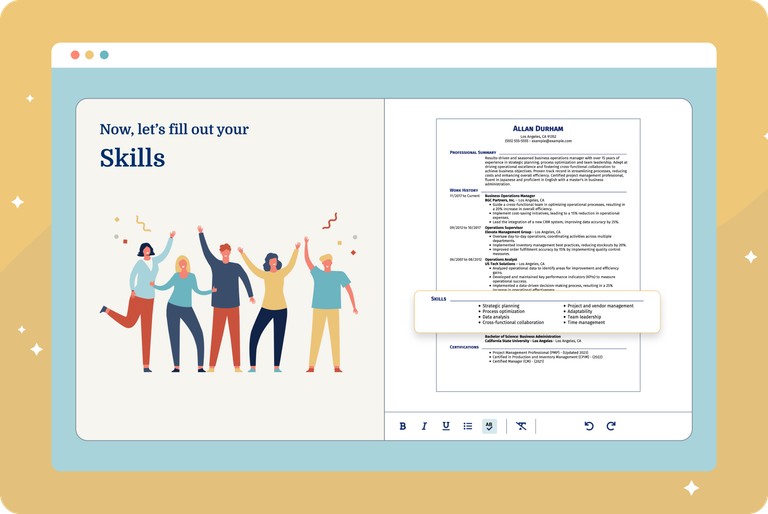
Cognitive Skills: Examples for Your Resume

Our customers have been hired at: *Foot Note
Cognitive skills are brain functions that enable the smooth operation of processes such as learning, information processing, problem-solving and decision-making.
In this guide, we’ll explore the nuances of cognitive skills, including what they are, how to improve them and how to include them on your resume.
Browse examples of cognitive skills for various industries and use our Resume Builder to craft a standout job application that showcases the key abilities employers are seeking.
AI Resume Skills Generator
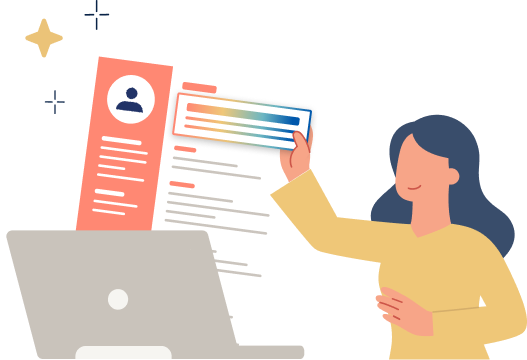
What are cognitive skills?

Cognitive skills refer to the mental processes involved in acquiring and retaining knowledge, processing information and solving problems.
These skills encompass various abilities such as language comprehension, critical thinking and decision-making. Some basic cognitive skills include:
- Attention: The ability to concentrate on specific stimuli while ignoring distractions.
- Memory: The capacity to encode, store and retrieve information.
- Perception: Interpreting sensory information from the environment.
- Processing: Perceiving and responding to information.
Basic cognitive skills allow us to absorb, store and process information. Metacognitive skills, on the other hand, allow us to monitor thinking, evaluate our understanding and adjust accordingly.
While cognitive skills focus on the actual mental processes involved in tasks, metacognitive skills involve reflecting on and controlling those processes.
Example of cognitive skills on a resume
Cognitive skills are critical in the workplace and it is important to list them prominently on your resume to impress potential employers.
Take a look at this research analyst resume for ideas on how you can incorporate cognitive skills into your resume:
Remember to personalize your resume by featuring skills that are listed in the job description. The sample resume above showcases cognitive skills in the following sections:
- Professional summary: The resume summary notes skills like "providing strategic solutions" and "assessing project performance," which require cognitive abilities such as information storage and processing.
- Skills section: The skills section of this resume features cognitive and metacognitive abilities related to research analyst roles, such as "forecasting," "analyzing trends" and "data audits."
- Work history section: The resume work history section offers examples of cognitive skills in action. For instance, "gathering data" and "executing research" require strong information processing and analysis abilities.
Top cognitive skills for the workplace
Cognitive skills and metacognitive skills influence how we learn, communicate, interact with others and navigate the world around us.
As such, they are integral to workplace success, enabling employees to analyze complex situations, generate innovative solutions and communicate effectively with colleagues.
Below is a list of cognitive skills and metacognitive skills that are critical in the workplace.
- Critical thinking: The ability to analyze information objectively, evaluate its validity and make reasoned decisions is crucial for problem-solving and effective decision-making.
- Problem-solving: Employees with strong problem-solving skills can identify challenges, assess potential solutions and implement effective strategies to overcome obstacles.
- Creativity: The capacity to generate innovative ideas is valuable for developing new products, improving processes and finding novel solutions to complex problems.
- Attention to detail: Maintaining accuracy through strong organizational skills and attention to detail is crucial across a variety of industries and roles.
- Decision-making: Sound decisions based on consideration of potential outcomes are essential for leadership roles and day-to-day responsibilities.
- Memory skills: The ability to retain and recall information efficiently is important for learning new concepts, following instructions and recalling essential details.
- Communication: Effective communication skills, including active listening and conflict resolution skills, help build strong relationships with colleagues and clients.
- Time management: Efficiently allocating time, prioritizing tasks, and meeting deadlines are essential for productivity and success in fast-paced work environments.
Explore our guide on crafting a strong resume skills section for examples of how to list skills on your resume to stand out to hiring managers.
Examples of cognitive skills by industry
Cognitive and metacognitive skills contribute to productivity, efficiency and overall job performance, making them essential for professional success across many industries and roles.
Recall that metacognitive skills involve monitoring and regulating cognitive processes, lending to self-reflection, planning and goal setting, adaptation and transfer of learning.
Metacognition is crucial in the workplace as it enables employees to optimize their performance, adapt to changing circumstances, collaborate with others and make informed decisions.
Explore examples of cognitive skills and metacognitive skills for various industries below to brainstorm key abilities to feature on your resume.
Education
- Critical thinking: Teachers use critical thinking to evaluate educational materials and lesson plans, assess student progress and design effective teaching strategies.
- Problem-solving: Educational administrators employ problem-solving skills to address challenges related to curriculum development and resource allocation.
- Communication: Effective communication skills are essential for educators to convey information clearly and engage students in learning activities.
- Flexibility: Educators must be flexible in adapting instructional methods to meet students' diverse learning styles and responding to unexpected classroom situations.
- Emotional intelligence: Teachers utilize emotional intelligence to create supportive and inclusive learning environments and build positive relationships.
Health care
- Diagnostic reasoning: Health care professionals use diagnostic reasoning skills to analyze patient symptoms, interpret diagnostic tests and formulate accurate diagnoses.
- Attention to detail: Attention to detail is crucial for health care providers to accurately document patient information and detect subtle changes in patient condition.
- Decision-making: Clinicians make critical decisions about patient treatment options, medication management and care coordination.
- Memory skills: Health care professionals rely on memory skills to recall medical knowledge and procedural guidelines during clinical decision-making and patient care.
- Interpersonal skills: Interpersonal skills are essential for health care providers to communicate effectively with patients and collaborate with multidisciplinary care teams.
Finance
- Analytical thinking: Financial analysts use analytics skills to evaluate market trends and analyze financial statements to make informed decisions.
- Numerical reasoning: Financial professionals employ numerical reasoning skills to calculate financial ratios and perform quantitative analysis for risk assessment.
- Attention to detail: Attention to detail is critical for financial professionals to identify errors in financial reports and ensure accuracy in financial transactions.
- Decision-making: Financial managers make strategic decisions about capital allocation, budgeting and investment strategies.
- Problem-solving: Financial planners use problem-solving skills to address clients' financial needs and goals and develop customized financial plans.
Engineering
- Critical thinking: Engineers apply critical thinking skills to analyze engineering problems and develop innovative solutions to complex technical challenges.
- Spatial reasoning: Spatial reasoning is essential for engineers to visualize and manipulate three-dimensional objects and interpret technical drawings.
- Problem-solving: Engineers use problem-solving skills to identify engineering problems and develop efficient and cost-effective solutions to improve processes and products.
- Creativity: Engineering professionals employ creativity to generate innovative ideas, design new products and technologies and optimize existing systems.
- Collaboration: Collaboration skills are vital for engineers to work effectively in multidisciplinary teams and integrate diverse perspectives to achieve project objectives.
Technology
- Logical reasoning: Software developers use logical reasoning skills to analyze software requirements and write code that meets functional specifications and quality standards.
- Problem-solving: Technology professionals employ problem-solving and technical skills to diagnose software bugs and develop effective solutions.
- Creativity: Technology innovators utilize creativity to envision new products and features and develop innovative solutions to address emerging market needs and trends.
- Adaptability: Technology professionals must be adaptable to rapidly changing technologies, evolving customer requirements and dynamic market conditions.
- Communication: Effective communication skills are essential for technology professionals to collaborate with cross-functional teams.
Browse our library of 800+ resume examples for professionally crafted samples that demonstrate how you can showcase your unique skills and qualifications.
How to improve your cognitive skills
There are various steps that you can take to improve both your cognitive skills and your metacognitive skills. We’ve detailed examples of each below to help you get started.
Improving cognitive skills
Improving cognitive skills involves engaging in activities that challenge and stimulate the brain. Here are some strategies to enhance cognitive skills:
- Mental stimulation: Engage in brain-stimulating activities such as puzzles, crosswords, Sudoku, chess or brain-training games to improve memory and problem-solving skills.
- Stress management: Chronic stress can impair cognitive function and memory. To reduce stress, practice stress management techniques such as deep breathing.
- Lifelong learning: Keep your brain active and engaged by learning new skills, hobbies and languages or pursuing interests that challenge and stimulate your mind.
- Practice mindfulness: Incorporate mindfulness meditation or relaxation techniques into your daily routine to improve cognitive skills and overall well-being.
Improving metacognitive skills
Improving metacognitive skills involves developing awareness of your thinking processes and learning strategies to optimize them. Here are some ways to enhance metacognitive skills:
- Goal setting: Set specific learning goals and objectives for yourself and develop strategies to achieve them.
- Monitoring: Monitor your own understanding and progress during learning activities. Pay attention to signs of uncertainty, and actively seek clarification when needed.
- Note-taking: Develop effective note-taking strategies to organize and retain information. Review and revise your notes regularly to reinforce learning.
- Self-regulation: Develop self-regulation skills to manage your time, attention and motivation effectively.
How to feature cognitive skills on your resume
- Create a dedicated skills section: Include a dedicated "Skills" section near the top of your resume and include cognitive skills relevant to the job or industry.
- Use action verbs: Use strong action verbs that highlight your cognitive abilities. For example, "Analyzed data to identify trends and patterns."
- Provide concrete examples: Whenever possible, provide quantifiable achievementsthat demonstrate your cognitive skills in action to demonstrate a positive impact.
- Tailor your resume: Customize your resume for each job application by emphasizing cognitive skills that are most relevant to the specific role and industry.
- Include transferable skills: Emphasize transferable skills that highlight your ability to adapt and apply cognitive skills across diverse professional contexts.
- Include relevant keywords: Use keywords related to cognitive skills and job-specific terminology to ensure your resume gets picked up by applicant tracking systems (ATS).
Key takeaways
- Cognitive skills are the mental abilities and processes involved in acquiring, processing and utilizing information.
- Cognitive skills involve the mental processes used for tasks like memory, while metacognitive skills involve the awareness and control of those cognitive processes.
- Cognitive skills are crucial in the workplace as they enable employees to efficiently process information, solve complex problems and adapt to dynamic challenges.
FAQ
What are cognitive thinking skills?
Cognitive thinking skills encompass a range of mental processes and abilities that enable individuals to interpret, analyze and manipulate information effectively.
Basic cognitive abilities include memory, attention and processing speed, which are crucial for encoding, storing and retrieving information.
These skills form the foundation of human cognition, facilitating various aspects of learning, problem-solving, decision-making and creativity.
Explore our guide on how to write a resume for tips and examples of how you can effectively showcase relevant skills on your resume.
How do you explain cognitive skills on a resume?
On a resume, cognitive skills can be effectively highlighted within the context of your work experience and accomplishments.
For instance, you could describe a project where you used critical thinking to analyze complex data and develop actionable insights, resulting in improved decision-making for your team.
By incorporating concrete examples and outcomes, you can demonstrate your proficiency in cognitive skills and showcase your value as a capable and analytical professional.
See our resume formats guide to learn the different ways that you can structure your resume depending on your professional background and experiences.
What is an example of cognitive intelligence?
One example of cognitive intelligence in the workplace is a data analyst’s ability to interpret and analyze complex datasets to derive actionable insights for decision-making.
This high-income skill applies metacognitive skills such as critical thinking, logical reasoning and problem-solving to understand the data and draw meaningful conclusions.
Writing a data analyst resume? Use one of our professional resume templates to take the guesswork out of formatting and designing your resume.
How do I develop my cognitive skills?
One approach to developing cognitive skills is to engage in activities that require problem-solving and critical thinking, such as puzzles, brain teasers or strategy games.
Additionally, seeking out opportunities for learning and intellectual growth, such as taking classes, attending workshops or reading books can help expand cognitive abilities.
Cultivating a healthy lifestyle that includes adequate sleep, a balanced diet and stress management techniques can also support optimal cognitive function.
What are examples of cognitive practices?
Cognitive practices refer to activities or exercises designed to stimulate and improve cognitive function. Examples of cognitive practices include:
- Brain training games: Playing cognitive training games or apps designed to target specific cognitive abilities, such as memory, attention or processing speed.
- Learning a new skill or language: Acquiring a new skill or learning a new language challenges the brain and promotes cognitive flexibility, memory and executive function.
- Memory exercises: Practicing memory techniques such as mnemonics, visualization or association can improve memory retention and recall.
- Mindfulness meditation: Engaging in mindfulness meditation practices can enhance attention, concentration and cognitive control.
- Creative activities: Participating in creative pursuits such as drawing, painting, writing or playing a musical instrument stimulates the brain and promotes cognitive flexibility.
Incorporating these practices into your daily routine can enhance your cognitive skills and support your overall well-being.
Our customers have been hired at:*Foot Note




